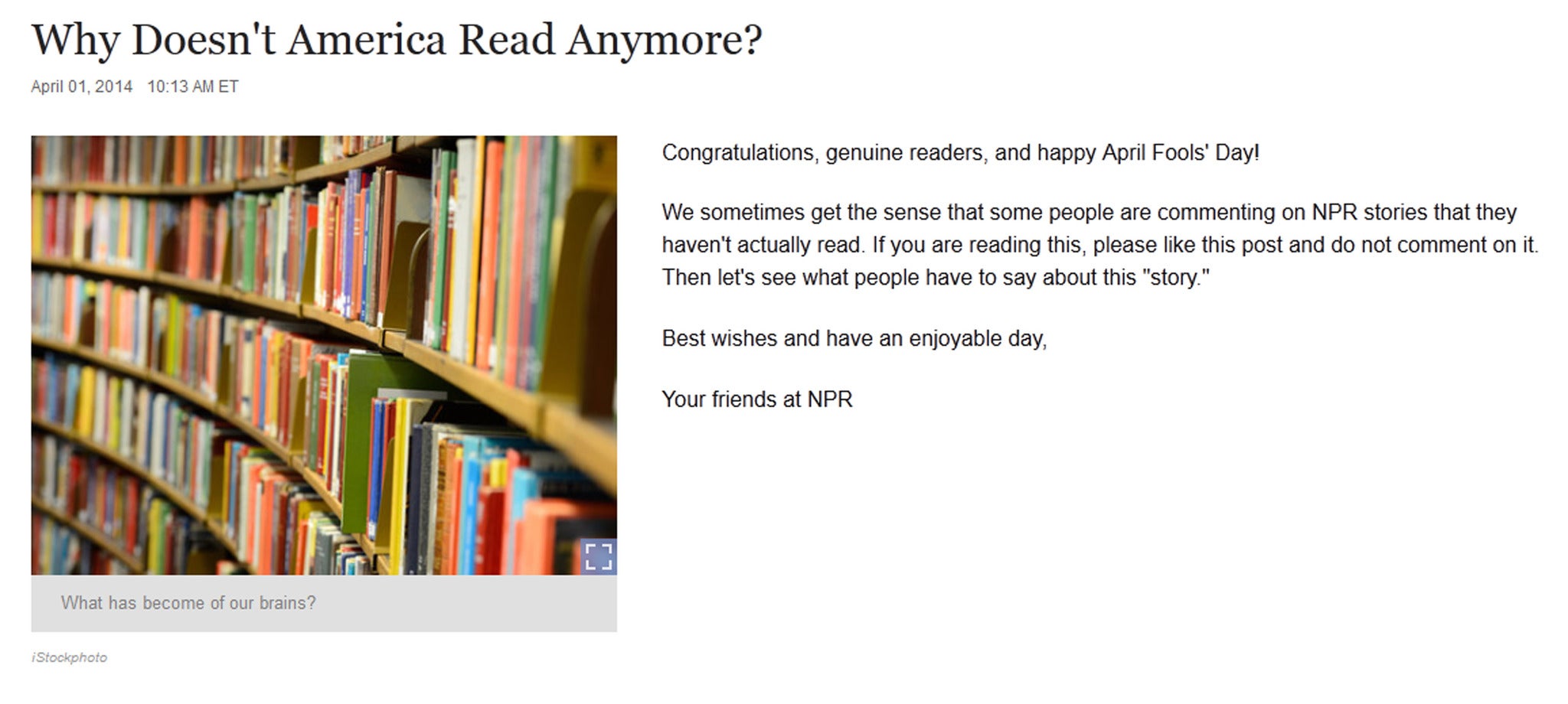Rhodri Marsden: Skim-reading will cause many to miss the point of this column

Amid last week's glut of flimsy April Fool gags, one stood out slightly from the pack. NPR, the American public radio network, published a short article online entitled: "Why Doesn't America Read Anymore?"
More of an experiment than a piece of journalism, it wished everyone a happy April Fool's Day, then suggested that many people merely read the headline and no further. Sure enough, irate Facebook users immediately sounded off, expressing outrage that they were being accused of not reading things properly, thus proving that they hadn't read the article properly. Whoever came up with the idea at NPR could be forgiven for basking in smug self-satisfaction; it was a brilliant illustration of the deterioration in our ability to read carefully.
Plenty of people will refute this idea, pointing at a large pile of novels they've read recently and challenging us to quiz them on plot development. But a recent article in The Washington Post quoted a cognitive neuroscientist, Maryanne Wolf, who expressed concern that "the superficial way we read during the day is affecting us when we have to read with more in-depth processing". Her comments provoked a reaction from English teachers who are appalled that their pupils seem unable to digest a novel such as Middlemarch because of decreased attention spans and a nagging frustration that George Eliot isn't getting to the point fast enough. It's not hard to see why that might be happening.
The prevalence online of bullet-pointed listicles, sponsored links, multiple tabs, email alerts, animated advertising and a general feeling of time pressure (whether real or imagined) could all contribute to a lack of engagement with the things we're reading. I've got three shelves full of books here that I haven't started, because at any particular moment I seem to find the frivolous use of social media to be more satisfying than reading them. Short term, this may well be true; long term it doesn't feel that way. The books sit there and mock me.
It's hard to pin blame for this – not least because there are many people who think that it's not a problem, that wistfully yearning for a time when we languidly perused the pages of a book is just misplaced nostalgia. And we're evidently consuming words voraciously on screen; even a list-heavy sites such as Buzzfeed has recognised the appeal of long-form journalism. But how good is our reading comprehension? The new media we're confronted with is, according to Wolf, causing our brains to adapt in order to navigate the streams of information. The result is a form of skim-reading that's akin to playing an album at double speed. Points are missed, the eye skips to the start of new paragraph in order to get the gist more rapidly and, as the NPR prank proved, people claim to have read things that they simply haven't. We're becoming poorly informed because we can't be bothered to inform ourselves.
One reading innovation, Sprint, has tackled the perceived problem of time-pressured reading by flashing individual words in front of our eyes rapidly in succession, forcing us to absorb information faster. But reading does not equal comprehension and reading without comprehension is barely reading at all. So perhaps slow readers, once treated with derision, are the clever ones. They're taking in the information at a rate the brain can handle, while the rest of us are skim-reading columns such as this one and leaving a comment underneath saying "too long".
Subscribe to Independent Premium to bookmark this article
Want to bookmark your favourite articles and stories to read or reference later? Start your Independent Premium subscription today.

Join our commenting forum
Join thought-provoking conversations, follow other Independent readers and see their replies